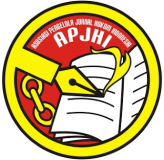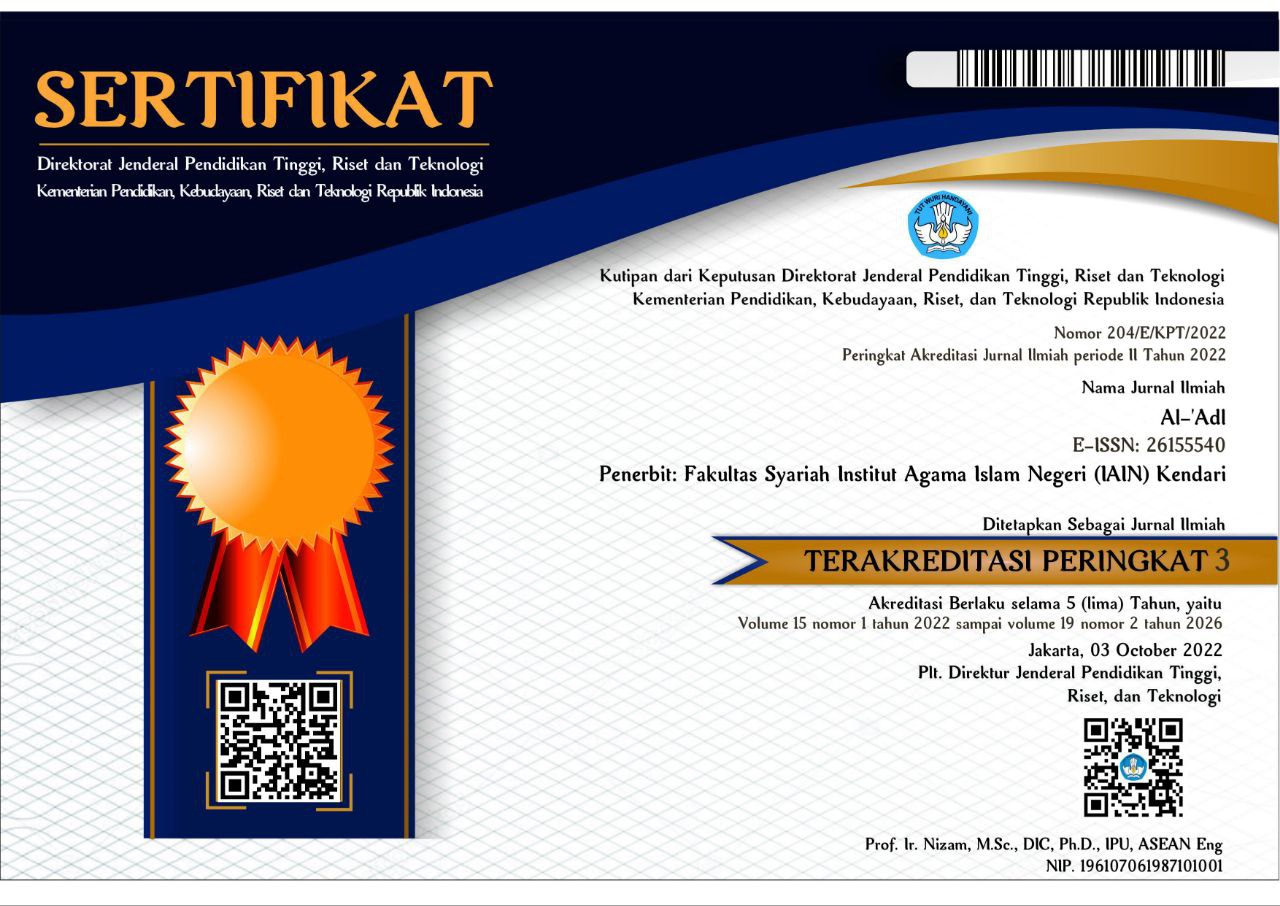From Dakwa to Fatwa: the Linguistic Violence behind Preacher's Digital Narrative
Abstract
Keywords
Full Text:
PDFReferences
Ab Majid, M. Z. (2004). Fatwa dan Isu Semasa: Masalah dan Cabaran di Malaysia. Jurnal Syariah, 12(2), 79–93.
Afandi, M., Rofiuddin, A., Zamhari, A., Rahman, Y., Farida, A. R., & Bakti, A. M. F. (2021). The New Ustad in Religious Authority: Challenge and Dynamic of Fatwa in the New Media Era.
Alnizar, F., Ma’ruf, A., & Manshur, F. M. (2019). Perceptions and Reactions of Ahmadiyya To Fatwa Indonesian Ulama Council (Mui): an Antrophological Lingusitics Approach. Heritage of Nusantara: International Journal of Religious Literature and Heritage, 8(2), 208–242. https://doi.org/10.31291/hn.v8i2.553
Alnizar, F., Ma’ruf, A., & Manshur, F. M. (2021). The language of fatwa: Understanding linguistic violence in the Indonesian ulama council’s fatwa on Ahmadiyah. Ahkam: Jurnal Ilmu Syariah, 21(1), 1–24. https://doi.org/10.15408/ajis.v21i1.20218
Alrasheed, R., & Mabon, S. (2020). Fatwas and politics in Bahrain: exploring the post 2011 context. Middle Eastern Studies, 57(1), 151–165. https://doi.org/10.1080/00263206.2020.1821666
Assyaukanie, L. (2009). Fatwa and Violence in Indonesia. Journal of Religion and Society, The Kripke Centre, 11, 1–21.
el-Fadl, Khaled Abou. “Atas Nama Tuhan: Dari Fiqh Otoriter Ke Fiqh Otoritatif Terj.” R. Cecep Lukman. Jakarta: Serambi, 2004.
Bormann, N.-C., Cederman, L.-E., & Vogt, M. (2015). Language, Religion, and Ethnic Civil War. Journal of Conflict Resolution, 61(4), 744–771. https://doi.org/10.1177/0022002715600755
Bunt, G. R. (2003). Islam in the digital age: E-jihad, online fatwas and cyber Islamic environments. JSTOR.
Burhani, A. N. (2021). It’s a Jihad: Justifying Violence towards the Ahmadiyya in Indonesia. TRaNS: Trans-Regional and -National Studies of Southeast Asia, 9(1), 99–112. https://doi.org/10.1017/trn.2020.8
Fauzi, N. A. F. (2017). Fatwa di Indonesia: Perubahan Sosial, Perkembangan dan Keberagamaan. Jurnal Hukum Novelty, 8(1), 108. https://doi.org/10.26555/novelty.v8i1.a5524
Galtung, J. (1990). Cultural Violence. Journal of Peace Research, 27(3), 291–305. https://doi.org/10.1177/0022343390027003005
Gay, W. C. (1997). The reality of linguistic violence against women.
Gay, W. C. (1998). Exposing and overcoming linguistic alienation and linguistic violence. Philosophy & Social Criticism, 24(2–3), 137–156. https://doi.org/10.1177/019145379802400210
Gay, W. C. (1999). Linguistic violence. In Institutional violence (pp. 13–34). Brill.
Hallaq, W. B. (1994). From Fatwās to Furü: Growth and Change in Islamic Substantive Law. Islamic Law and Society, 1(1), 29–65.
Haramain, M., Nurhikmah, N., Juddah, A., & Rustan, A. (2020). Contestation of Islamic Radicalism in Online Media: A Study with Foucault’s Theory on Power Relation. Im. https://doi.org/10.4108/eai.1-10-2019.2291698
Hassan, S. A., & Khairuldin, W. M. K. F. W. (2020). Research design based on fatwa making process: An exploratory study. International Journal of Higher Education, 9(6), 241–246. https://doi.org/10.5430/ijhe.v9n6p241
Hidayatullah, M. S., Dimyathi, M. S., Abdullah, Zubair, & Handayani, R. (2020). The cyber islam contestation in indonesia. International Journal of Advanced Science and Technology, 29(7), 34–44.
Horst, H. A., & Miller, D. (2020). Digital anthropology. Routledge.
Ibrahim, B., Arifin, M., & Abd Rashid, S. Z. (2015). The Role of Fatwa and Mufti in Contemporary Muslim Society. Pertanika Journal of Social Sciences & Humanities, 23.
Ibrahim, I., & Wan Khairuldin, W. M. K. F. (2017). Fatwa as a Medium Da wah: Studies on the Role of Mufti as a Preacher. International Journal of Academic Research in Business and Social Sciences, 7(4), 166–168. https://doi.org/10.6007/ijarbss/v7-i4/2775
Kaptein, N. J. G. (2004). The voice of the “Ulamǎ”: Fatwas and religious authority in Indonesia. Archives de Sciences Sociales Des Religions, 125(1), 115–130. https://doi.org/10.4000/assr.1038
Kaussler, B. (2011). British-Iranian relations, The Satanic Verses and the Fatwa: A case of two-level game diplomacy. British Journal of Middle Eastern Studies, 38(2), 203–225. https://doi.org/10.1080/13530194.2011.581819
Lema, D. A. (2021). Kajian aqidah Ustadz Abdul Somad melalui dakwahnya pada youtube tentang Patung Salib Kristen ditinjau dari perspektif Hermeneutika Paul Ricoeur. UIN Sunan Ampel Surabaya.
Miladi, N., Karim, S., & Athambawa, M. (2017). Fatwa on satellite TV and the development of Islamic religious discourse. Journal of Arab & Muslim Media Research, 10(2), 129–152.
Mohiuddin, A., Suleman, M., Rasheed, S., & Padela, A. I. (2020). When can Muslims withdraw or withhold life support? A narrative review of Islamic juridical rulings. Global Bioethics, 31(1), 29–46. https://doi.org/10.1080/11287462.2020.1736243
Muhammad, N. E. (2016). Fatwa dalam Pemikiran Hukum Islam. Al-Mizan, 12(1), 150–177.
Mundiri, A., & Tohet, M. (2018). Contestation of Religious Identity in the Cyber World: A Case Study of arrahmah.com and VOA Islam Dealing with Religious Others on Facebook. Walisongo: Jurnal Penelitian Sosial Keagamaan, 26(2), 391. https://doi.org/10.21580/ws.26.2.3244
Muzakka, A. K. (2018). Otoritas Keagamaan Dan Fatwa Personal Di Indonesia. Epistemé: Jurnal Pengembangan Ilmu Keislaman, 13(1), 63–88. https://doi.org/10.21274/epis.2018.13.1.63-88
Nasution, K., & Tahir, M. (2010). Morality of Fatwa in the Islamic Law Thinking. Millah, ed(khus), 85–97. https://doi.org/10.20885/millah.ed.khus.art5
Pambayun, E. L., Surasman, O., & Soedjono, S. R. (2021). The Configuration of Da’wah in Indonesia on Technoreligion: A Communication Theory of Identity (CTI) Approach. ESENSIA: Jurnal Ilmu-Ilmu Ushuluddin, 22(2), 245–261.
Ramli, M. A. Bin, Abdul Rahim, R. A., Abdul Razak, M. I., Yusof Salleh, M. Y., Hasan, P., & Zulkepli, M. I. S. (2018). Fatwa Sebagai Medium Counter-Terrorisme. Al-Banjari : Jurnal Ilmiah Ilmu-Ilmu Keislaman, 17(2), 223. https://doi.org/10.18592/al-banjari.v17i2.2133
Ranstorp, M. (1998). Interpreting the broader context and meaning of Bin-Laden’s Fatwa. Studies in Conflict and Terrorism, 21(4), 321–330. https://doi.org/10.1080/10576109808436072
Rusli, Hasyim, M. S., & Nurdin. (2020). A new islamic knowledge production and fatwa rulings how indonesia’s young muslim scholars interact with online sources. Journal of Indonesian Islam, 14(2), 499–518. https://doi.org/10.15642/JIIS.2020.14.2.499-518
Rusli, R. (2011). Tipologi Fatwa Di Era Modern: Dari Offline Ke Online. HUNAFA: Jurnal Studia Islamika, 8(2), 269. https://doi.org/10.24239/jsi.v8i2.365.269-306
Rusli, R., & Nurdin, N. (2022). Understanding Indonesia millennia Ulama online knowledge acquisition and use in daily fatwa making habits. Education and Information Technologies, 27(3), 4117–4140. https://doi.org/10.1007/s10639-021-10779-7
Saat, N. (2016). Theologians “Moralising” Indonesia?: The Case of the Post-New Order Ulama Council of Indonesia (MUI). Asian Journal of Social Science, 44(4–5), 546–570. https://doi.org/https://doi.org/10.1163/15685314-04404005
Sirry, M. (2013). Fatwas and their controversy: The case of the Council of Indonesian Ulama (MUI). Journal of Southeast Asian Studies, 44(1), 100–117. https://doi.org/DOI: 10.1017/S0022463412000641
Slama, M. (2018). Practising Islam through social media in Indonesia. Indonesia and the Malay World, 46(134), 1–4. https://doi.org/10.1080/13639811.2018.1416798
Syahnan, M., & Ja’far. (2021). Examining Religious Moderation of the Al-Jam’Iyatul Washliyah Fatwa Council. Journal of Indonesian Islam, 15(1), 21–46. https://doi.org/10.15642/JIIS.2021.15.1.21-46
Terem, E. (2021). Muslim men, European hats: a fatwā on cultural appropriation in a global age. The Journal of North African Studies, 1–26. https://doi.org/10.1080/13629387.2021.1973246
Von Mahmud El-Wereny. (2018). Fatwas und Muftis im Zeitalter des Internets : Das Fatwa-Portal islamfatwa . de als Fallstudie von Mahmud El-Wereny. 6, 57–77.
Wan Khairuldin, W. M. K. F. (2011). Metode fatwa Sheikh’Ali Juma’ah dalam kitab al-Kalim al-tayyib-fatawa’asriyyah/Wan Mohd Khairul Firdaus bin Wan Khairuldin. University of Malaya.
Weimann, G. (2011). Cyber-fatwas and terrorism. Studies in Conflict and Terrorism, 34(10), 765–781. https://doi.org/10.1080/1057610X.2011.604831
Widjajanti, A., & Damarsanti, W. T. (2017). The Symbolic Violence in Language. 4(10), 9–15.
Wirawan, Y. (2014). Kekerasan Budaya Pasca 1965: Bagaimana Orde Baru Melegitimasi Anti-Komunisme melalui Sastra dan Film by Wijaya Herlambang. In Social Transformations: Journal of the Global South (Vol. 2, Issue 2). https://doi.org/10.13185/st2014.02208
Widigdo, M. S. A., & Hamid, H. (2018). The Power of Fatwā in Indonesia: An Analysis of MUI’s Controversial Fatwās. Afkaruna: Indonesian Interdisciplinary Journal of Islamic Studies, 14(2), 146-165. https://doi.org/10.18196/aiijis.2018.0085.146-165
Zamhari, A., Han, M. I., & Zulkifli, Z. (2021). Traditional religious authorities in New Media: Cariustadz. id Platform as An Alternative Cyber Fatwa and Da’wah Media among the Middle-Class Urban Muslims. AHKAM: Jurnal Ilmu Syariah, 21(1).
Zulkifli, Z. (2013). The ulama in Indonesia: Between religious authority and symbolic power. MIQOT: Jurnal Ilmu-Ilmu Keislaman, 37(1), 180–197. https://doi.org/10.30821/miqot.v37i1.79
DOI: http://dx.doi.org/10.31332/aladl.v16i2.6356
Refbacks
- There are currently no refbacks.
Copyright (c) 2023 Muhammad Iqbal

This work is licensed under a Creative Commons Attribution 4.0 International License.








Organized by : Fakultas Syariah
Published by : Institut Agama Islam Negeri (IAIN) Kendari
Jl. Sultan Qaimuddin No. 17, Kec. Baruga, Kota Kendari, Provinsi Sulawesi Tenggara
phone. +62401-3193710
Fax. +62401-3193710
Email: [email protected]









